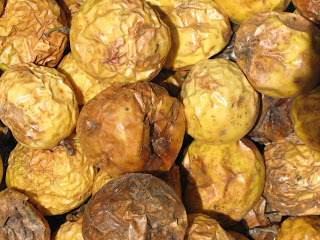speaking of saffron and spices....
 Mr. Tart and I just returned from an idyllic week on the half-French, half-Dutch Caribbean island of Saint Martin. The sea water was calm and clear and turquoise, just like all the photos you see of tropic islands, and the French restaurants remarkable, but the most food-bloggable place we went was the open-air market. The above photo shows the statue at its entrance in honor of all the women who work and shop there.
Mr. Tart and I just returned from an idyllic week on the half-French, half-Dutch Caribbean island of Saint Martin. The sea water was calm and clear and turquoise, just like all the photos you see of tropic islands, and the French restaurants remarkable, but the most food-bloggable place we went was the open-air market. The above photo shows the statue at its entrance in honor of all the women who work and shop there.Now, I love open-air markets in France--the colors, the smells, the funky cheeses, the possibility of stumbling across a little old lady selling dandelion greens who cautions you to pour your vinaigrette over them well before you serve them because they're so bitter. But I think the St. Martin market, though smaller than most of those I've meandered through in France, is a must-see. You can't find buckets of pliable and sticky and relatively inexpensive vanilla beans in Paris, for example!
 Or wrinkly passion fruit looking like rotted apples but smelling like a drink you want to pour into a coconut shell and decorate with a paper umbrella....
Or wrinkly passion fruit looking like rotted apples but smelling like a drink you want to pour into a coconut shell and decorate with a paper umbrella.... You can tell how much I loved this market by the fact that I even took pictures of the stubby bananas--yes, me, who can't stand bananas!
You can tell how much I loved this market by the fact that I even took pictures of the stubby bananas--yes, me, who can't stand bananas! The fresh fish goes fast--only the sign was left when we got there around 10:00 am. (But don't worry, I'll post about our other island lobster opportunities later!)
The fresh fish goes fast--only the sign was left when we got there around 10:00 am. (But don't worry, I'll post about our other island lobster opportunities later!) The market ladies also sell whole nutmegs, curry powders, peppercorns, mixtures for grilling fish, and much more. Including bags of sunshine yellow powder labeled "safran" (saffron) for suspiciously low prices. They were too good to be true, I thought, so I bypassed them. Later on, at a different stall, I touched a knobby root and asked the lady what it was. "Safran," she explained, thus confirming that the yellow powder couldn't possibly be saffron, the world's most expensive spice harvested by hand from tempramental flowers. I felt cheated, even though I hadn't bought any of it. Were they deliberately misleading the tourists? Or is "safran" on the islands different from "safran" on the mainland? I double checked my best bilingual dictionary when I got home, hoping that, say, "turmeric" would be an acceptable less-common translation. But no, "safran" is supposed to be saffron.
The market ladies also sell whole nutmegs, curry powders, peppercorns, mixtures for grilling fish, and much more. Including bags of sunshine yellow powder labeled "safran" (saffron) for suspiciously low prices. They were too good to be true, I thought, so I bypassed them. Later on, at a different stall, I touched a knobby root and asked the lady what it was. "Safran," she explained, thus confirming that the yellow powder couldn't possibly be saffron, the world's most expensive spice harvested by hand from tempramental flowers. I felt cheated, even though I hadn't bought any of it. Were they deliberately misleading the tourists? Or is "safran" on the islands different from "safran" on the mainland? I double checked my best bilingual dictionary when I got home, hoping that, say, "turmeric" would be an acceptable less-common translation. But no, "safran" is supposed to be saffron.








